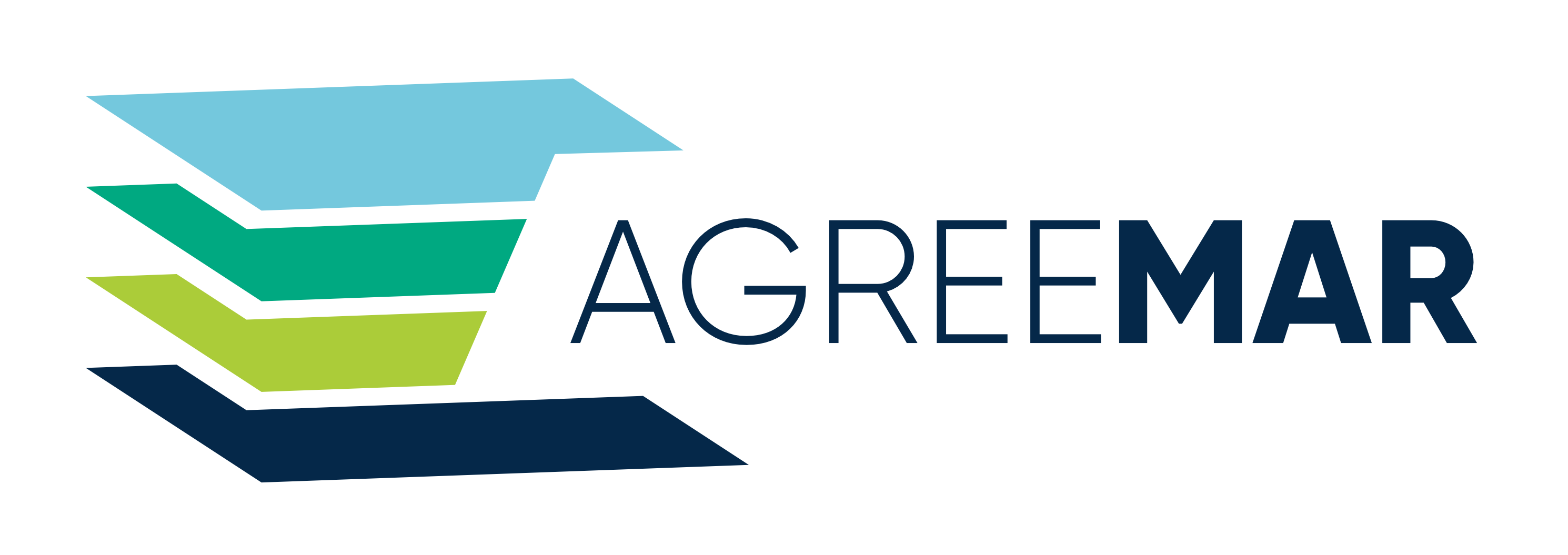Work package 1. Fostering stakeholders’ engagement
The needs, capacities, roles, responsibilities and commitment as well as engagement of stakeholders from four Mediterranean case studies will be mapped at national/regional/local level and analyzed for the development of the feasibility maps, the elaboration and endorsement of adaptive agreements, and their implementation for a local MAR system.
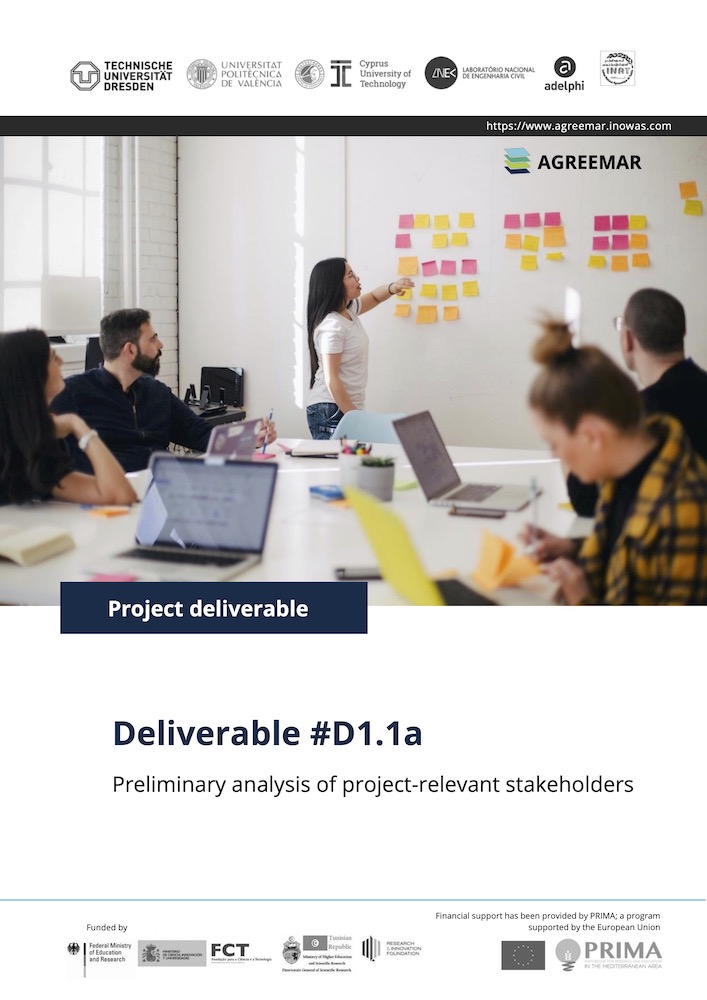
D1.1a Preliminary analysis of project-relevant stakeholders
Deliverable D1.1a identifies for each project demo site the key stakeholders at three levels that are significant for the joint development of an overall governance agenda for MAR and its participatory implementation at the local level. In addition, initial assumptions are made about the needs and competences of the identified stakeholders in relation to MAR.
Download PDF (1.4 MB)
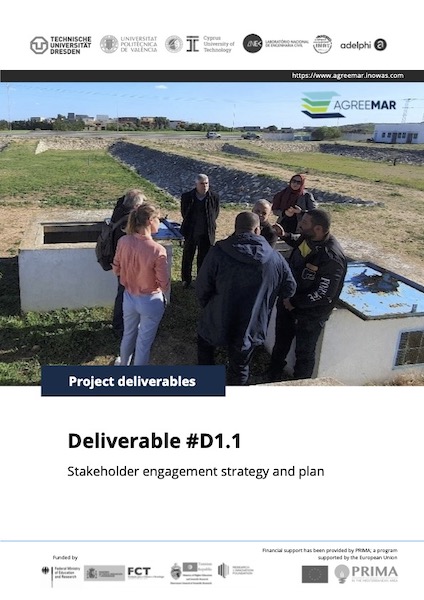
D1.1 Stakeholder engagement strategy and plan
Deliverable D1.1 provides project partners with tailor-made engagement formats adapted to the needs of the stakeholders, guided in addressing typical engagement challenges and managing conflicts, as well as establishing mechanisms for monitoring and evaluating the engagement progress.
Download PDF (3.9 MB)
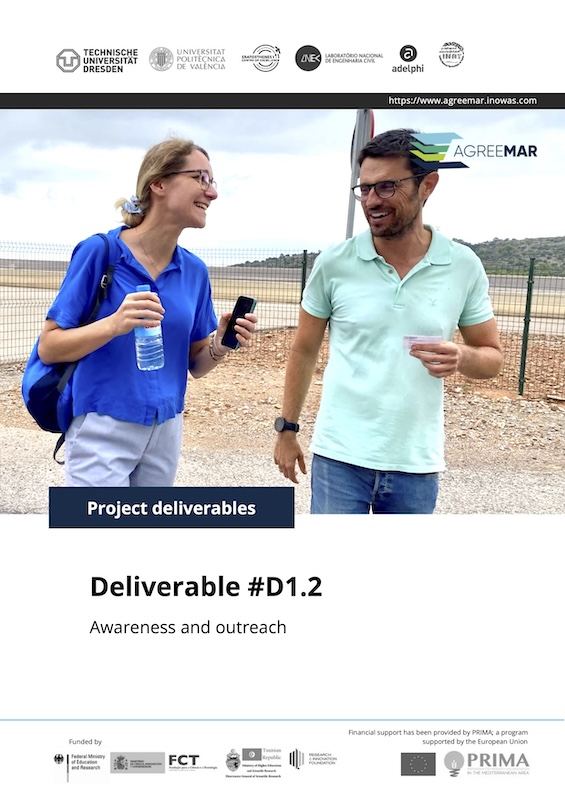
D1.2 Awareness and outreach campaign
The present report provides an overview of awareness raising and outreach activities from the start of the project until 30 November 2023. The dissemination channels include on-site and online participative stakeholder workshops at various stages of the project, participation in scientific conferences and workshops, publication of project deliverables, development and consolidation of a general identity image through a modern corporate design that includes also templates, logos, flyers and brochure, website etc.
Download PDF (6.8 MB)
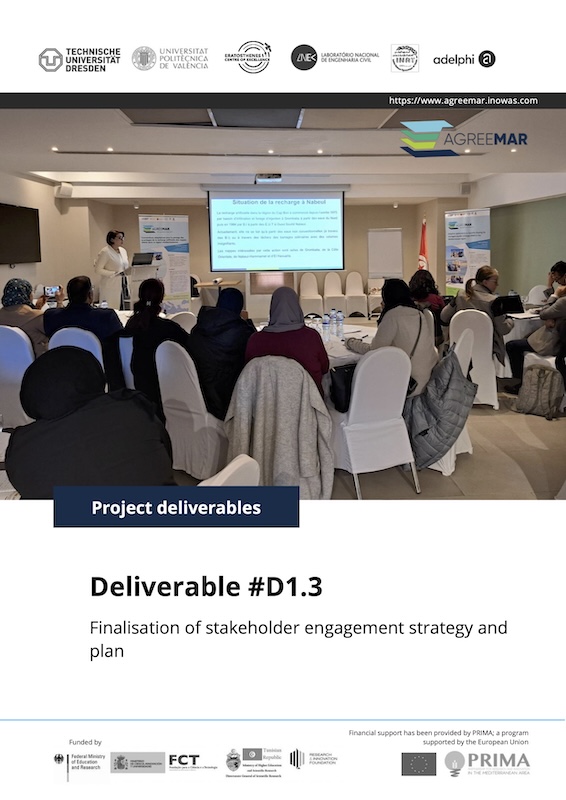
D1.3 Finalisation of stakeholder engagement strategy and plan
To guide project partners in effectively engaging stakeholders during AGREEMAR activities and beyond, this present D1.3, which is the updated version of D1.1, provides a stakeholder engagement strategy and plan. Through this, project partners were provided with tailor-made engagement formats adapted to the needs of the stakeholders, guided in addressing typical engagement challenges and managing conflicts, as well as establishing mechanisms for monitoring and evaluating the engagement progress.
Download PDF (1.2MB)
Work package 2. MAR feasibility mapping
A set of methodologies for MAR feasibility assessment at regional level will be developed, including a comprehensive matrix of feasibility criteria and considering biophysical, technological, social, economic, environmental, hydrological, institutional, and financial indicators.
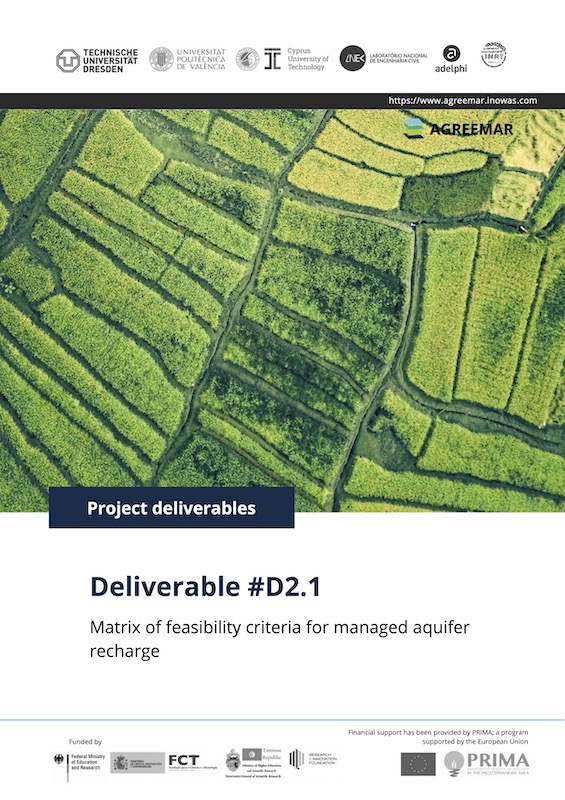
D2.1 Matrix of feasibility criteria for managed aquifer recharge
Deliverable D2.1 is dedicated to the compilation of an extensive database containing hydrogeological, geochemical, biophysical, environmental, social, economic feasibility criteria for managed aquifer recharge. The current version of the database can be downloaded from the following address: http://agreemar.inowas.com/feasibility-criteria/.
Download PDF (0.9 MB)
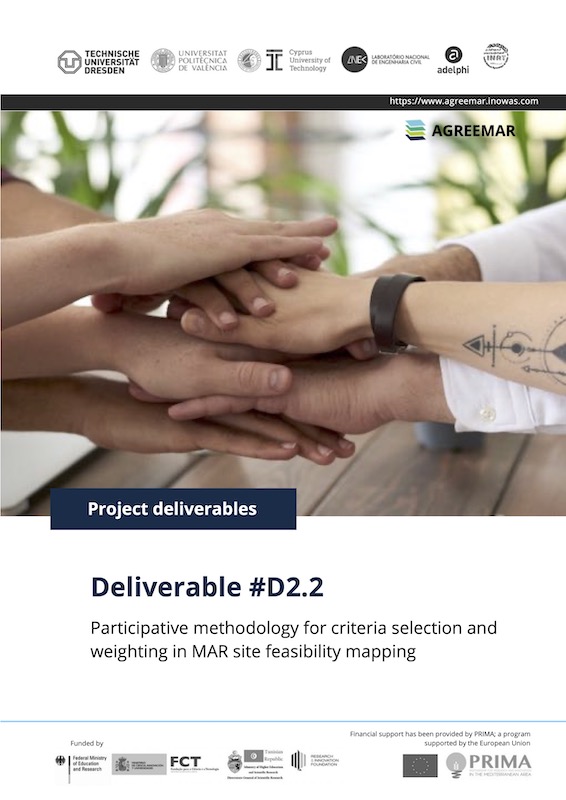
D2.2 Participative methodology for criteria selection and weighting in MAR site feasibility mapping
Deliverable D2.2 is dedicated to the development of a new methodological approach for mapping the geospatial feasibility of managed aquifer recharge applications. The report focuses on the selection and weighting of feasibility criteria and their integration into a GIS-based multi-criteria decision analysis.
Download PDF (1.1 MB)
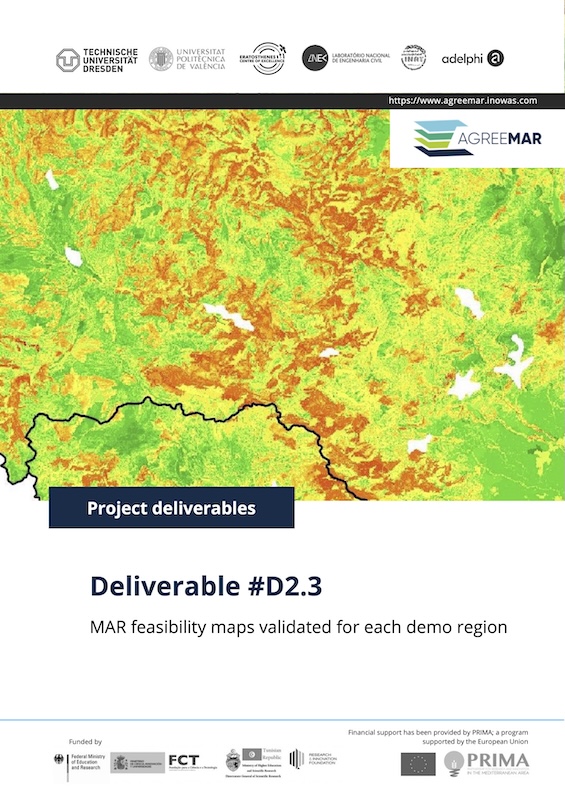
D2.3 MAR feasibility maps validated for each demo region
Deliverable 2.3 is dedicated to the development of feasibility maps for each demo region based on the adaptive methodology described in Deliverable 2.2 which integrates two workflows centered on expert-based input and active stakeholder participation. This report focuses on providing a step-by-step description of the methodology used for creating the MAR feasibility maps, including problem definition, constraint mapping, criteria selection, standardisation of criteria values, weights assignment, feasibility mapping and validation.
Download PDF (5.8 MB)
Work package 3. Adaptive governance framework
The feasibility maps will be used for the elaboration of an adaptive governance framework for MAR benefits sharing. This will include drafting country-specific multi-sectorial, multi-stakeholder agreements on water allocation plans for MAR implementation. The general objective is to provide draft agreements for MAR among stakeholders from different societal sectors, integrating the general, regional and local scales.
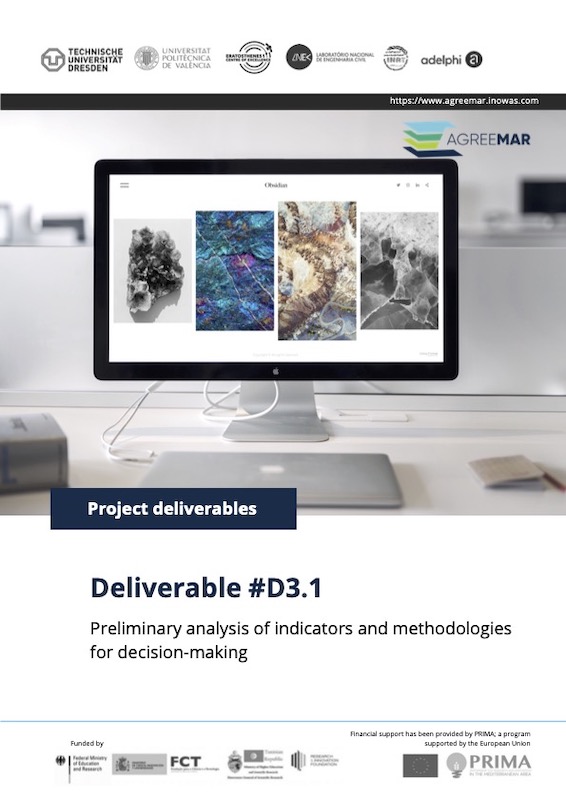
D3.1 Preliminary analysis of indicators and methodologies for decision-making
Deliverable D3.1 provides a preliminary analysis of indicators and methodologies for decision-making and highlights the importance of integrated water management and the use of indicators for planning and sustainable exploitation of managed aquifer recharge (MAR) projects.
Download PDF (2.1 MB)
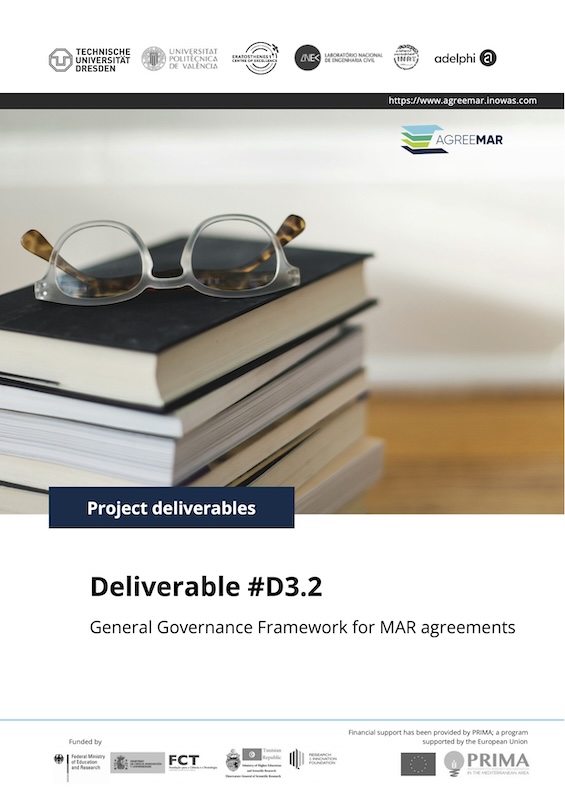
D3.2 General Governance Framework for MAR agreements
Deliverable D3.2 presents a general governance framework to support managed aquifer recharge (MAR) agreements. It provides a fundamental basis, paving the way for the co-creation of committed and responsible agreements that are essential to the effective management of MAR systems.
(Deliverable 3.2 is for the moment not available for download as to allow the publication of articles)
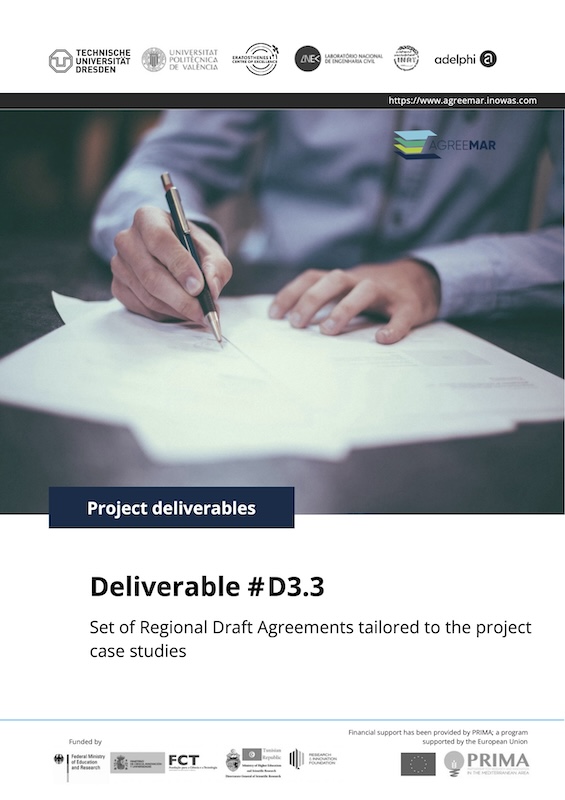
D3.3 Set of Regional Draft Agreements tailored to the project case studies
Deliverable D3.3 covers the technical assessments, stakeholder engagement, regulatory framework analysis, and the elaboration of guidelines for managed aquifer recharge (MAR) agreements implementation tailored to each case study of the AGREEMAR project in Spain, Portugal, Tunisia, and Cyprus.
(Deliverable 3.3 is for the moment not available for download as to allow the publication of articles)
Work package 4. Validation through numerical modelling
The governance scenarios will be supported at local scale by groundwater flow models that will help to understand the response of the aquifer to the proposed interventions and to discuss with stakeholders’ alternative scenarios including the no-action impacts.
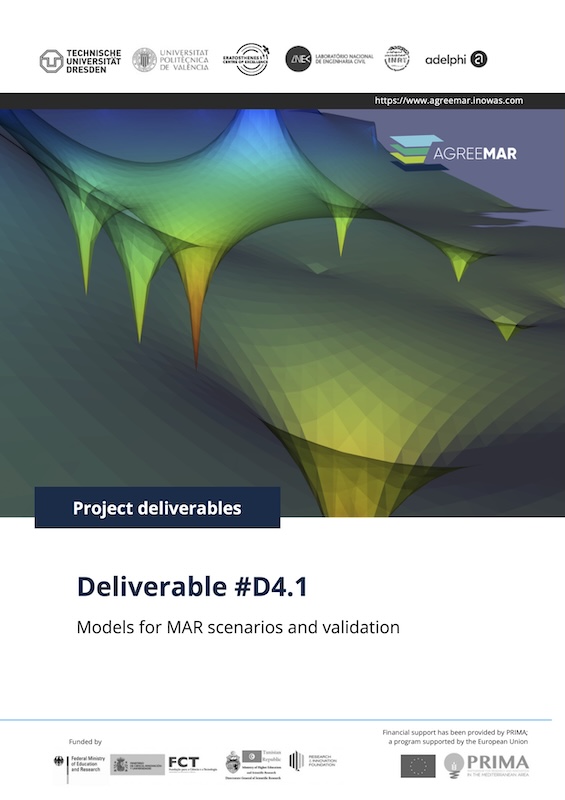
D4.1 Models for MAR scenarios and validation
Deliverable 4.1 summarises the numerical groundwater flow modelling work using MODFLOW as well as the basin modelling work using AQUATOOL at the four AGREEMAR demonstration sites in Spain, Portugal, Cyprus and Tunisia to quantitative evaluate the local implementation of MAR. The models enable the identification, validation and further improvement via interventions of existing or planned MAR schemes located in the case study regions based on consolidated scientific evidence.
(Deliverable 4.1 is for the moment not available for download as to allow the publication of articles)
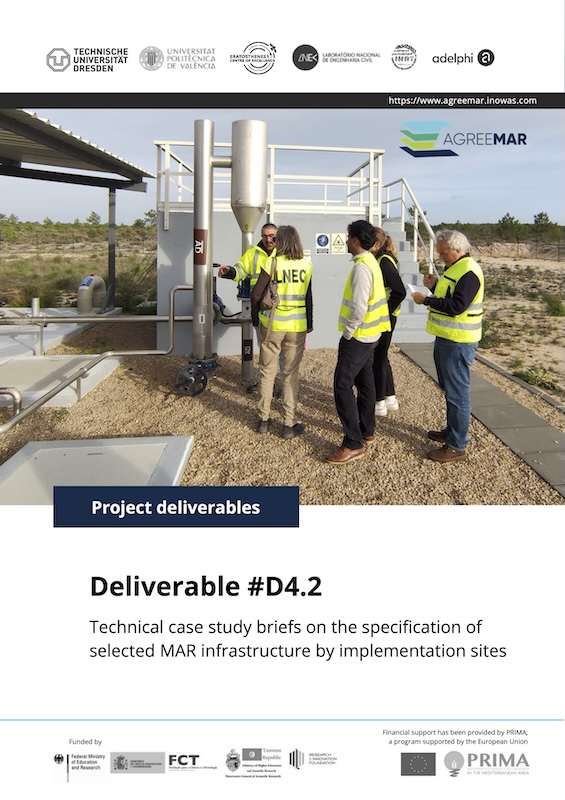
D4.2 Technical case study briefs on the specification of selected MAR infrastructure by implementation sites
Deliverable D4.2 provides Technical Case Study Briefs with the main numerical modelling outcomes for each of the four demonstration sites, addressing the main questions and concerns raised by stakeholders during project meetings. These findings offer valuable insights into the effects of various water management scenarios, helping to support future decision-making considering new water resources and alternative manage-ment strategies.
Download PDF (11.6 MB)
Work package 5. Agreements implementation at local scale
A general costs-benefits analysis for areas selected for implementation will assess the economic impact of the MAR schemes. The governance framework will be refined based on groundwater flow simulations and economic valuation, and specific agreements will be negotiated with local stakeholders.
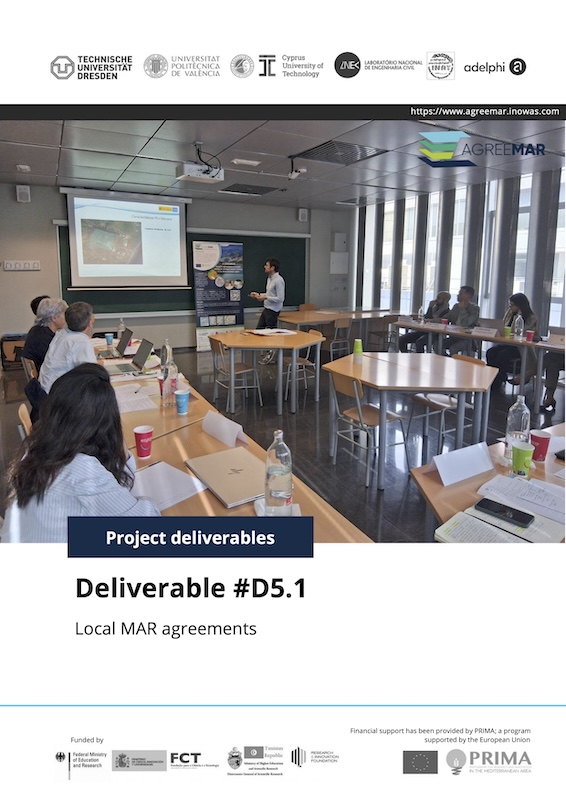
D5.1 Local MAR agreements
This deliverable presents the methodology and insights gained from developing adaptive Local MAR Agreements (LMA) to strengthen MAR governance in Mediterranean countries, specifically Cyprus, Tunisia, Portugal and Spain. It addresses the challenges of MAR implementation, including regulatory complexities, public mistrust and stakeholder coordination, and proposes LMA — adaptive, participatory agreements tailored to local contexts — as a solution to promote equitable benefit sharing, transparency, and sustainability of MAR systems.
Download PDF (4.4 MB)
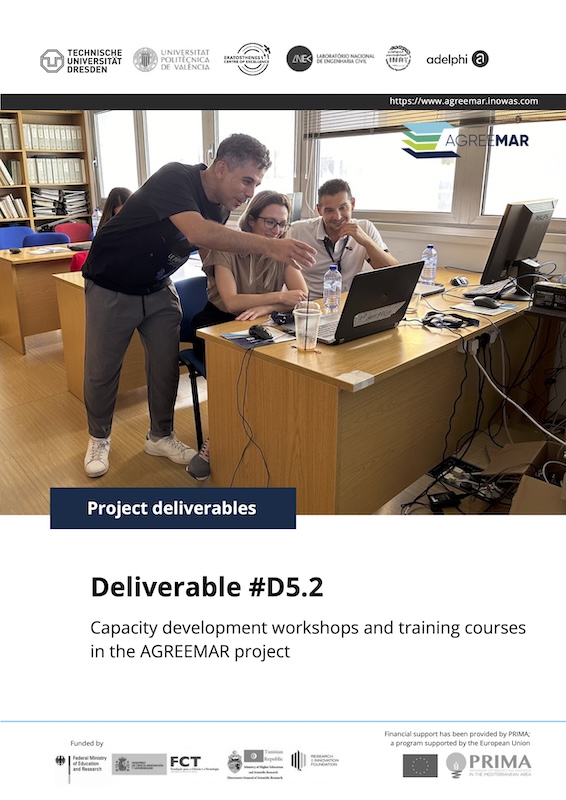
D5.2 Capacity development workshops and training courses in the AGREEMAR project
Deliverable D5.2 provides an overview of the capacity development formats conducted across the four case sites of the AGREEMAR project in Cyprus, Spain, Portugal and Tunisia. These formats play a vital role in enhancing the institutional and managerial capacities of stakeholders, ensuring the sustainability and long-term adoption of the project outcomes.
Download PDF (3.2 MB)
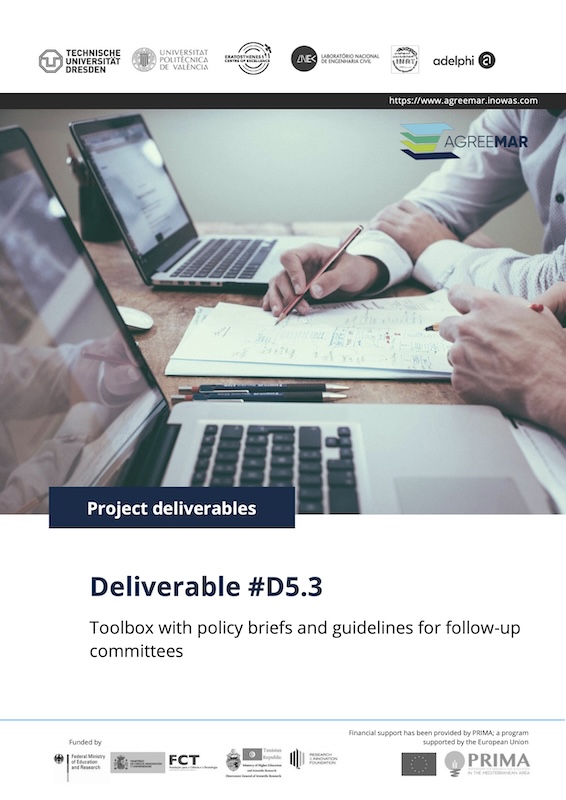
D5.3 Toolbox with policy briefs and guidelines for follow-up committees
Deliverable D5.3 provides a toolbox with policy briefs and guidelines developed in the framework of the AGREEMAR project to support follow-up committees in the four demonstration sites.
Download PDF (1.8 MB)
Work package 6. Project management
The project will be managed and coordinated by TUD together with the Principal Investigators (PI) from each partner institution and with direct collaboration with the WP leaders to ensure the successful implementation and the completion of milestones and deliverables.
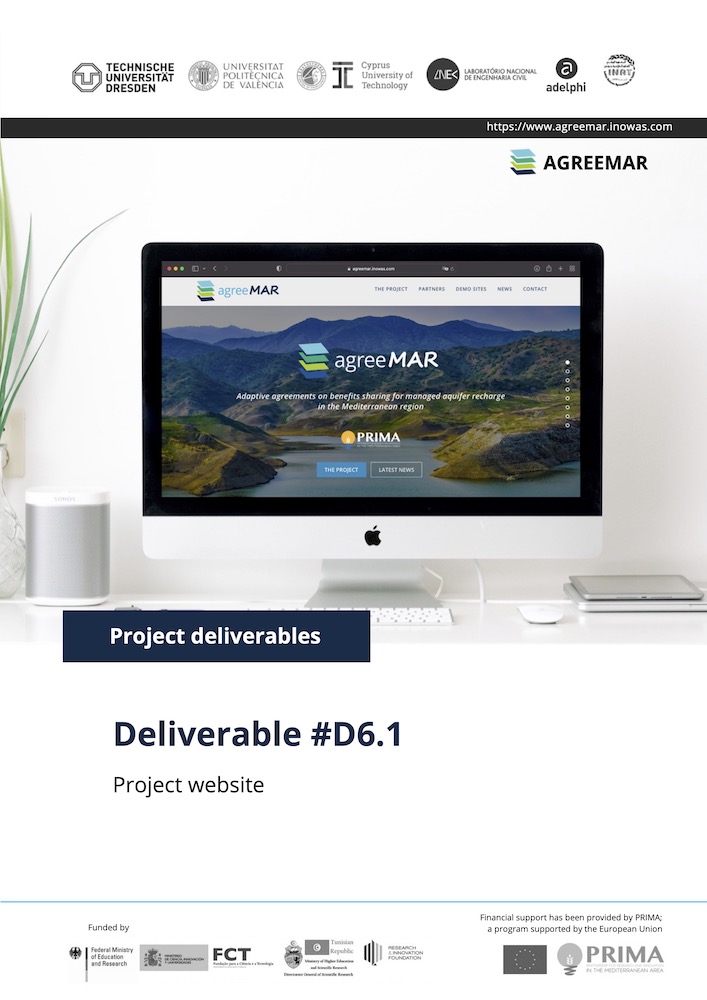
D6.1 Project website
This report describes the website of the AGREEMAR project. The website was developed by the Research Group INOWAS at Technische Universität Dresden and launched in July 2022. The website serves as central tool for dissemination of project results and external communication. The URL of the website is: https://agreemar.inowas.com.
Download PDF (6.7 MB)
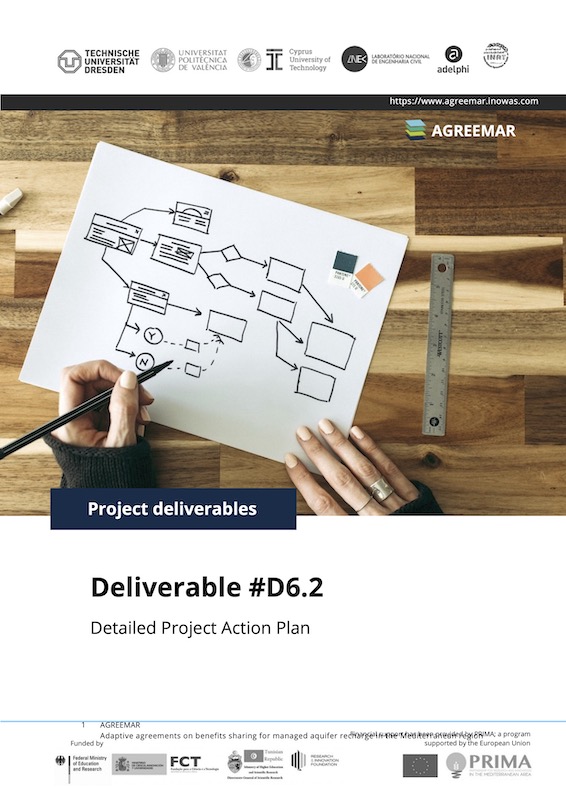
D6.2 Detailed Project Action Plan
This report describes the detailed Project Action Plan (PAP) of the AGREEMAR project. It includes the detailed planning of project tasks including sub-tasks, responsible institutions, the table of deliverables and the GANTT chart.
Download PDF (2.3 MB)
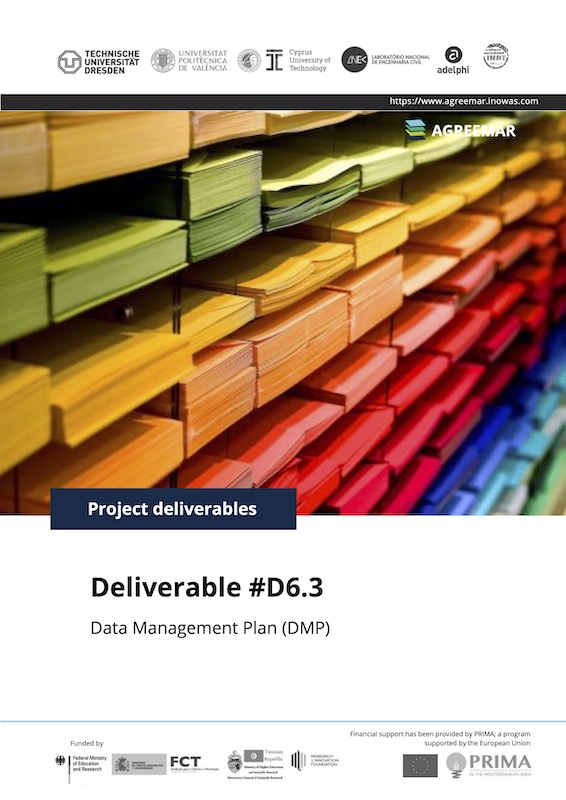
D6.3 Data Management Plan (DMP)
This document contains the Data Management Plan (DMP) of the AGREEMAR project. The DMP describes the practices adopted for data management according to general guidelines set by the European Commission and in compliance with the Cooperation Agreement signed by the consortium.
Download PDF (0.4 MB)
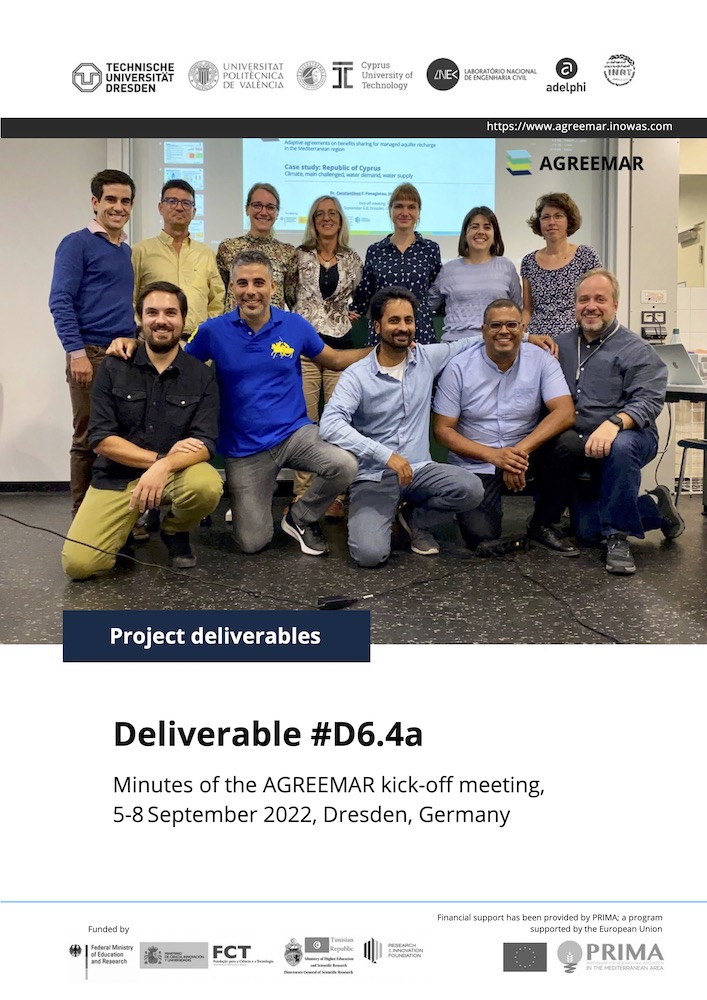
D6.4a Minutes of kick-off meeting in Dresden
This report summarizes the AGREEMAR kick-off meeting that took place between 5-8 September 2022 at the main Campus of Technische Universität Dresden, Germany. The kick-off meeting was divided into four parts: a) Preliminary bilateral workshops, b) Presentations on the main project objectives, working packages and demo sites, c) Three workshops on the project methodologies and d) Field trip on the Elbe River.
Download PDF (7.8 MB)
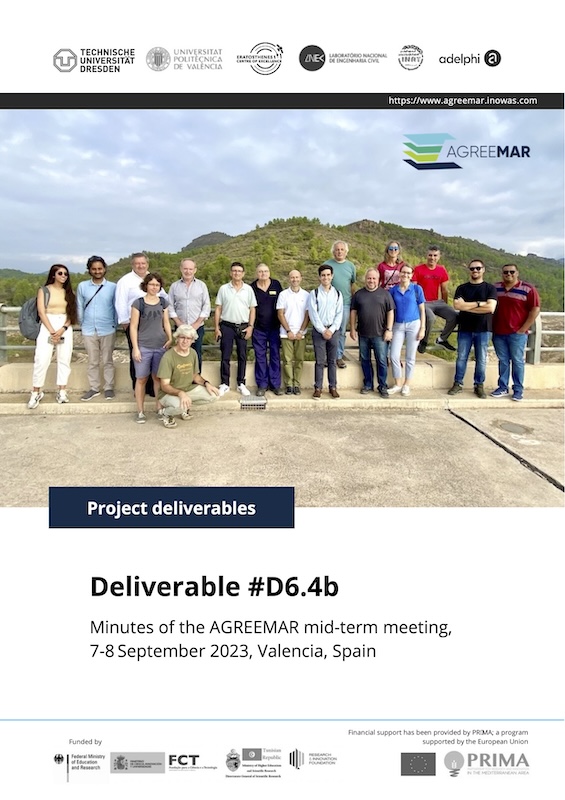
D6.4b Minutes of mid-term meeting in Valencia
This report summarizes the AGREEMAR mid-term meeting that took place on 7 and 8 September 2023 at the main Campus of Universitat Politècnica de València (UPV), Valencia, Spain. The mid-term meeting was divided into two parts: a) Presentations on the progress of project activities, b) Field trip to the Spanish case study sites including meetings with local stakeholders.
Download PDF (5.9 MB)
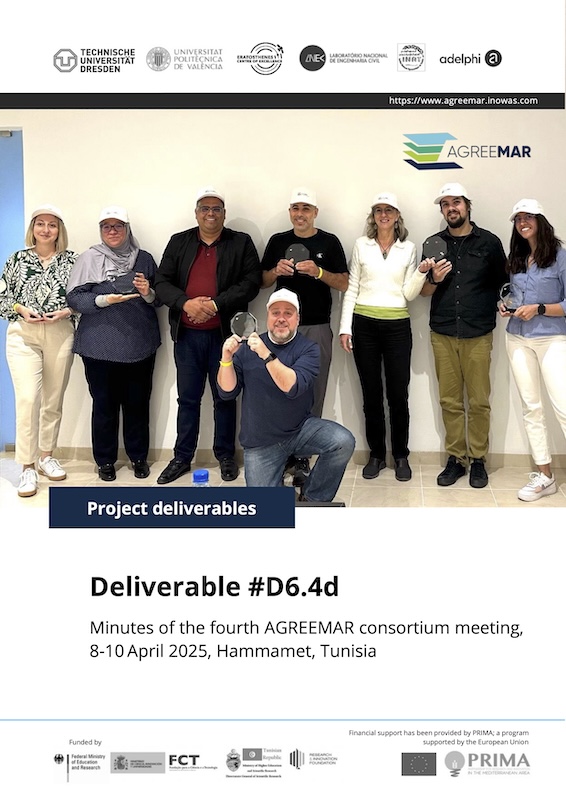
D6.4d Minutes of final meeting in Tunisia
This report summarizes the fourth AGREEMAR consortium meeting, focused on advancing Managed Aquifer Recharge (MAR) and sustainable water management in the Mediterranean. Partners reviewed project progress, shared scientific insights, and explored innovative MAR case studies. The meeting emphasized stakeholder engagement, policy recommendations, and future research directions. Field visits in Tunisia offered practical perspectives on MAR implementation.
Download PDF (1.2 MB)
